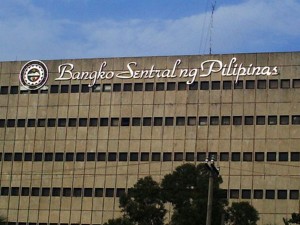
PRESENT INTEREST RATES STAY The Bangko Sentral ng Pilipinas will keep the present key interest rates, saying inflation is less of a concern now than the need to boost economic growth.
MANILA, Philippines—The Bangko Sentral ng Pilipinas kept on Thursday its key policy rates steady in the belief the current levels, now at historic lows, have been so far sufficient to help boost economic activity and avoid potential spike in inflation amid volatile global oil prices.
The BSP’s overnight borrowing and lending rates, which affect commercial interest rates, thus stay at record lows of 4 and 6 percent, respectively.
In a press conference on Thursday, BSP Governor Amando Tetangco Jr. said the decision of the central bank’s Monetary Board, which met on Thursday for the policy rate-setting, was deemed prudent at the moment as officials cited the need to closely monitor external price pressures, led by volatile oil prices in the world market, which could affect domestic inflation.
“The Monetary Board noted that the balance of risks to the inflation outlook now leans slightly toward the upside as oil prices have remained elevated and at risk from ongoing tensions in the Middle East as well as strong demand from emerging economies,” Tetangco said during the briefing held after the meeting of the Monetary Board.
Other potential inflationary risks that the BSP cited were a likely rise in foreign portfolio investments and higher prices of electricity amid petitions for further power-rate increases.
The BSP earlier this year cut the key policy rates twice to bring those at record-low levels, citing the need to stimulate the growth of the economy after a disappointing slowdown last year. Officials said low interest rates could help boost demand for loans, which in turn could push consumption and investments.
True enough, credit growth so far this year has been robust. As of February, data from the central bank showed that outstanding loans by universal and commercial banks grew by 18 percent year on year to P2.74 trillion. The BSP said the increase in bank lending benefited both individual and corporate borrowers.
Last year, the economy, measured in terms of gross domestic product, grew by 3.7 percent, a sharp deceleration from the 7.6 percent registered the previous year. For this year, the government wants the economy to recover from the slowdown and expand by a faster rate of between 5 and 6 percent.
Even so, the two previous rate cuts done in January and March were enough, and further reduction in the rates are not warranted at the moment given the need to monitor price pressures, according to the BSP.
While low interest rates help accelerate economic growth by stimulating demand, the resulting increase in purchases of goods and services may speed up inflation. The BSP said an appropriate level of interest rates would be needed to keep the economy growing without causing an inflation spiral.
According to the latest inflation report of the National Statistics Office, consumer prices grew by an average of 3.1 percent in the first quarter of the year, slower than the 4.5 percent registered in the same period last year.
The latest inflation rate is still benign, according to the BSP, as it is in line with the full-year target ceiling of 3 to 5 percent for 2012 and 2013.
Moreover, Guinigundo said, latest estimates by the BSP point to a potential inflation average of 3.1 percent for this year and 3.3 percent for next year.
Nonetheless, the BSP said the estimate could be breached if prices of oil and other imported goods rise at faster-than-expected levels. It said it should be cautious about potential impact of external price movements on domestic inflation.

